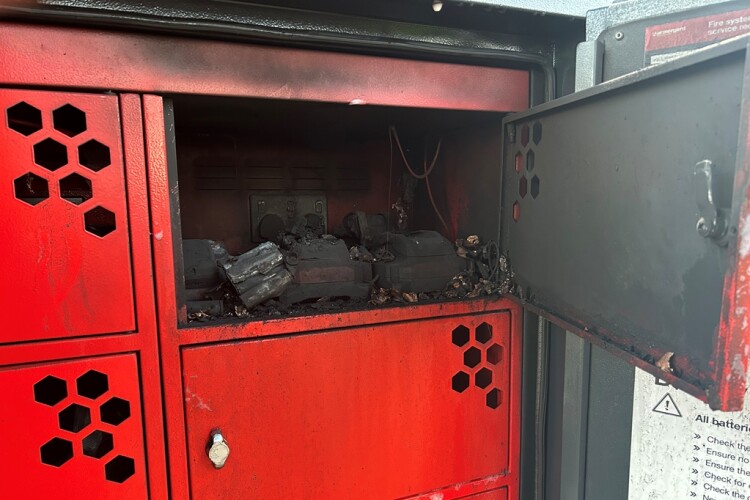It is not just e-scooters and e-bike that can be prone to apparent spontaneous combustion; so can power tools and light construction machinery. The common factor is the lithium-ion batteries that power them can be prone to ‘thermal runaway’, in which they enter a self-heating state that can result in explosion and fire. This is because they have such a high energy density.
It has been reported that UK fire services attended 921 fires linked to lithium-ion batteries in 2023, a 46% on 2022’s figures.
Gavin Coleman, a senior build manager with construction contractor Willmott Dixon, has first-hand experience. He returned to site on Thursday morning to find that one of the batteries in the charger bank had exploded overnight. (See video below.) His were stored safely so the fire was contained. Not all sites are so lucky or so organised.
The Hire Association Europe & Event Hire Association (HAE EHA) is publicly backing the Lithium-ion Battery Safety Bill, calling for increased awareness and education to save lives and reduce risk of fires.

The draft legislation aims to set down rules for the safe storage, use and disposal of lithium-ion batteries. It was introduced in July 2024 by Liberal Democrat peer Lord Redesdale and is currently at committee stage in the House of Lords and will later be considered by the House of Commons.
Carl Bartlett, director of certification services at HAE EHA, said: “We don’t want any more people to be hurt as a result of poor use or poor storage of lithium-ion batteries. There are too many avoidable instances where we believe better education about how to handle these batteries could save lives and livelihoods.
“Companies in the hire industry hiring out these devices need to be able to properly inform their customers and teams about how to safely use, transport, store and report any issues about their lithium-ion batteries. If these new resources can help avoid even one fire, their job has been done.”
HAE EHA’s advice for the safe handling of lithium-ion batteries includes:
- Before using the equipment, always read the manufacturer’s instruction manual.
- Be careful not to drop batteries or use them as hammers, impact and penetration can cause leakage, heat generation, smoke, fire or explosions.
- Keep batteries away from other metal objects. Screws, nails, washers or other similar objects can short the terminals on the battery. Always use a suitable carry case.
- Do not touch the battery poles with your fingers, tools or any other electrically conductive objects.
- Keep batteries away from rain, moisture, salts and other corrosive materials.
- Do not expose batteries to elevated temperatures, sparking or open flames, or direct sunlight behind glass.
- Do not incinerate batteries.
- Do not disassemble batteries.
- Only use chargers recommended by the manufacturer.
- Never use or charge a battery that has suffered impact or been damaged in any way.
Got a story? Email news@theconstructionindex.co.uk



